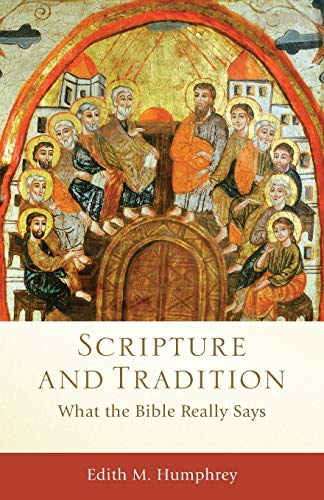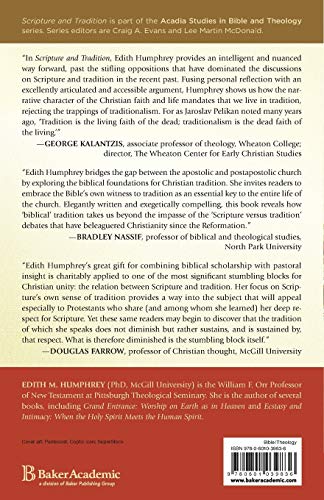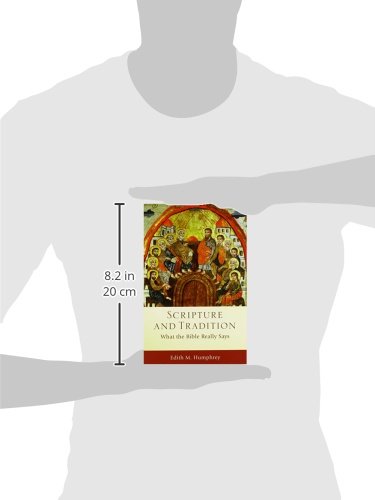Customer Services
Copyright © 2025 Desertcart Holdings Limited
Desert Online General Trading LLC
Warehouse # 7, 4th Street, Umm Ramool, Dubai, 30183, Dubai




Full description not available
D**P
I will never see tradition in the same way after reading this
Humphrey goes deep into tradition and agrees that some traditions can be changed while others cannot then explains why. It was a very enlightening read.
A**R
A very good read and tells the " real truth " about ...
The book is very informative and eye opening. A very good read and tells the " real truth " about the churches today.
C**W
Five Stars
seems an excellent book
J**S
Insightful
Many people do not know the difference between tradition and Tradition. It is not just a stylistic preference, but one meant to give a greater meaning to the word when used by particular Christians with particular reasons. This is only one of the many areas of disheveled understanding Edith Humphrey attempts to straighten out for those who are struggling with the supposed dichotomy between Scripture and Tradition. This is a deeply insightful book, arguing not for one position or another so much as it presents with careful detail to the witness of Scripture the value and place of Tradition.Humphrey presents in 6 chapters (and a conclusion) the case for a better understanding of Tradition. She speaks somewhat to her upbringing in the Salvation Army and her move to the Orthodox Church. This is heartening, as her approach is not one-sided and without experience but from one who has stood in both arenas. She knows well the dogma attached to those who are anti-tradition as well as the counterpoints. I found myself rather enjoying the communication of her past and present as the most grounding of the book -- as something touching both camps significantly more than the logic of her words.The first chapter of Scripture and Tradition attempts to reclaim the meaning of (T)radition by examining the translations and other missteps we employ ourselves. She notes well the role of the word translation and its rather intended meaning, interpretation. Whether it is the King James Version or the New Living Translation, all translations are but interpretations. She then focuses on the Greek here, paradosis and paradidōmi. This is not as in depth or unfriendly to autodidacts as one might suppose. She ends the chapter by calling attention to the argument of the anti-traditionalists that Scripture is not all there is and the rather tenuous notion this posits. Finally, Humphrey would have us see ourselves not as the "people of the book" but as the "people o the Christ. (44)"Her second and third chapter delves into the history of what Paul meant by paradosis and paradidōmi as compared to other Jewish traditions of the time. She is careful here to approach Protestants with ease so as to not take away from her argument. She understands the role that word has taken in our own tradition against tradition (see 67 for the perfect analogy here). She also decides to speak to those who value Tradition, reminding them of the proper place of the written word(s) -- not just Scripture, but so too creeds, liturgy, and other lettered orally expressed beliefs. In her third chapter -- she considers this the core -- she works to discover what the New Testament is saying in regards to Tradition.The final three chapters explore the theological allowance for Tradition, or rather, how best to accept Tradition as a theological necessity. She contends Tradition is God's gift to the Church (chapter 5, 109). It is a gift, however, that gives and is the gift. Tradition is given to us and we pass it on. It is a rather economic gift (108). With all of this, however, Humphrey closes the work with a word of warning against simply taking everything traditional as good. She commends to us freedom as well. Accompanying this chapter are four case studies of Tradition in Church History.Edith Humphrey mentions several times throughout this book about a personal discovery of Tradition as well as mentioning the rise of those, especially among Protestants, who are (re)discovering the Great Tradition. We can look at this one of two ways. Perhaps the Spirit is calling us back to a better reformation or rather people are finding that in the times of shifting sand holding on Tradition helps them to maintain some balance. What Humphrey does is to couch Tradition next to Scripture -- not equally, but not sub-ordinate either -- as an inseparable gift from God to the Church. She maintains a constant Scriptural edge throughout the book, dedicating herself to judicious review by those who would readily dismiss all things non-Scriptural. How can they if they honestly read her book?
S**M
Made me think
This is a book that explores the relationship between Scripture and tradition by Edith M. Humphrey, a professor of the New Testament at Pittsburg Theological Seminary. Although written largely with an Evangelical Protestant audience in mind, Humphrey is currently Eastern Orthodox though her upbringing was in the Salvation Army. There were things with the book that I agreed and disagreed.The GoodThe biggest take away for me is the fact that Christians must not have an over-reaction and assume that all church tradition is automatically a bad thing that undermines the Gospel. Scripture does not support the case that every tradition is automatically wrong or that something is wrong on the basis that it’s oral in its transmission. I also learned that there are several different approaches among Protestants concerning the relationship between Scripture and tradition. For instance, in talking about Anglicans she gave the illustration of a tricycle with the main wheel representing Scripture and tradition and reason as “supporting” back wheels; she also talked about the Methodists’ so called “Wesleyan Quadrilateral” of Scripture, tradition, reason and experience.Further ThoughtsI wished she could have talked more about her doctrine of the Bible more, seeing that the title is “Scripture and tradition.” For instance, how does her stance for or against the sufficiency of Scripture shape one’s view of the use of traditions? While she does go over what the Bible has to say about “traditions,” that is, things handed down orally, I wondered how does this shape Scripture’s relationship to “tradition” once the Canon of the New Testament was closed in her view and her arguments in support of it. I suppose she would allow a larger role of the place of traditions than I would.Over all I enjoyed the book even knowing before hand I wasn’t gong to agree with everything she said. I certainly won’t be a knee-jerk anti-traditionalist, or accept everything in the name of Church history either.NOTE: This book is provided to me free by Baker Academic and Net Galley without any obligation for a positive review. All opinions offered above are mine unless otherwise stated or implied.
G**E
Four Stars
A bit tedious to follow but some food for thought. Not always clear.
R**H
Well researched written explanation of the true meaning of Tradition.
A very readable account of what Orthodox Tradition (paradosis) is. She clearly shows how most English Bibles have mistranslated the Greek word as it occurs in the original texts to suit their bias. Bias is sadly the cause of many different divisions and groups within the Western Protestant Churches. It causes division in the Church. I believe that we all need to make use of the many easy electronic Bibles and word searches of the Strong's numbers. We will be shocked as to how common this is. New doctrines and teachings occur due to this. You do not need to be a Greek scholar to do this.It us a book I will recommend to many.
Trustpilot
1 week ago
2 months ago
2 weeks ago
1 month ago